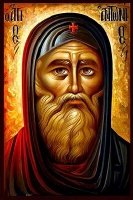This is the third in our series on St. Antony the Great (AD 251-356) of Egypt, leaning heavily on the biography written about AD 360 by St. Athanasius, one of the best-known works of literature in Christian world.
Antony is now 18 or 20 years old. After
providing for his younger sister to be brought up in a convent of virgins, and
selling his land and possessions and giving all to the poor, he now felt
unburdened. The cog or impediment of worldly possessions standing in his way of
his following Christ’s command, “If you would be perfect, go and sell that you
have and give to the poor” (Mt 19:21), was gone, as he also followed another
word, “Be not anxious for the morrow” (Mt 6:34).
Antony already had an established practice
of living a life of simplicity, attending Liturgy at the Church, and hearing
and memorizing the Scriptures he heard (as he was illiterate). But where would
he find guidance for his spiritual journey? At the time, there were not many
monasteries nor religious orders as we know them today. However, men who wanted
to follow Christ typically would live solitarily near their village, and Antony
did this. St. Athanasius writes that Antony stayed near the village he was
raised in and “devoted himself outside his house to discipline, taking heed to
himself and training himself with patience.” Very practical. Learn
self-discipline. Learn patience. Practice these virtues until they become a
habit.
The practice and training in self-discipline, particularly when done voluntarily for the love of God and/or spiritual improvement, is known as “ascesis” or “asceticism” (as an adjective, “ascetical”). Ascetical practices can be “internal” as applying to control of the mind, emotions, or heart (such as adopting patience, rejecting anxiety), or “external” as applying to bodily passions and drives (e.g., rejecting lust, fornication, and gluttony). Human reason knows that virtuous conduct is a great good, but Christian asceticism goes further in having the purpose of conforming to God’s law and Christ’s teachings, and obeying Christ’s command to deny ourselves, take up our cross, and follow Him (Mt 16:24). Although the term “asceticism” is not at all popular in present-day culture, even among Christians, it is absolutely necessary to some degree for anyone who wants to follow Christ and cease to live in sin; and for those who want to go further and be “perfect” (Mt 19:21), asceticism is the journey’s companion.
The ancients knew this without question. We are the ones who have forgotten.
St. Antony wanted to be “perfect” as
Christ had invited, so ascetical practices of self-discipline were naturally
where he began. St. Athanasius writes, “Now there was then in the next village
an old man who had lived the life of a hermit from his youth up. Antony, after
he had seen this man, imitated him in piety. And at first he began to abide in
places outside the village: then if he heard of a good man anywhere, like the
prudent bee, he went forth and sought him, nor turned back to his own palace
until he had seen him; and he returned, having got from the good man as it were
supplies for his journey in the way of virtue. So dwelling there at first, he
confirmed his purpose not to return to the abode of his fathers nor to the
remembrance of his kinsfolk; but to keep all his desire and energy for
perfecting his discipline.
“He worked, however, with his hands,
having heard, ‘he who is idle let him not eat’ [2 Thess 3:10], and [of his wages]
part he spent on bread and part he gave to the needy. And he was constant in
prayer, knowing that a man ought to pray in secret unceasingly. For he had
given such heed to what was read [i.e., what he heard] that none of the things
that were written fell from him to the ground, but he remembered all, and
afterwards his memory served him for books.”
Dibby Allan Green

